安徽省2021年中考英语语法专题突破三------冠 词(共29张PPT)
文档属性
| 名称 | 安徽省2021年中考英语语法专题突破三------冠 词(共29张PPT) |  | |
| 格式 | zip | ||
| 文件大小 | 922.1KB | ||
| 资源类型 | 教案 | ||
| 版本资源 | 通用版 | ||
| 科目 | 英语 | ||
| 更新时间 | 2020-12-28 19:42:14 | ||
图片预览

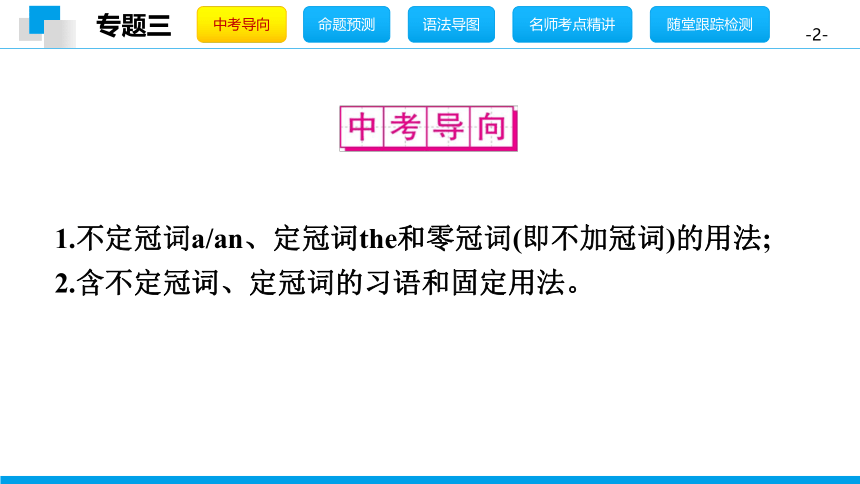
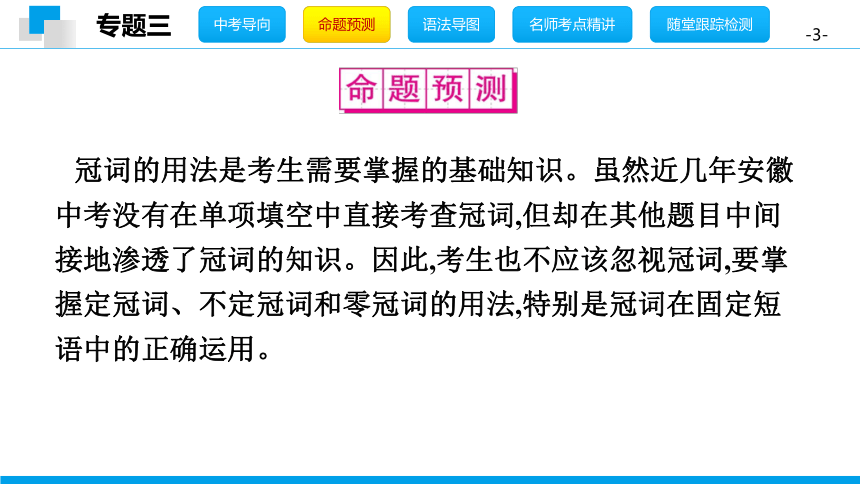
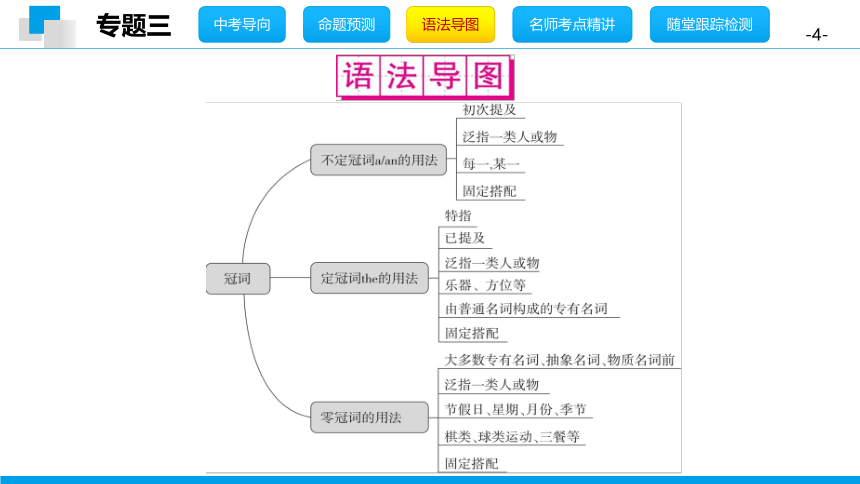
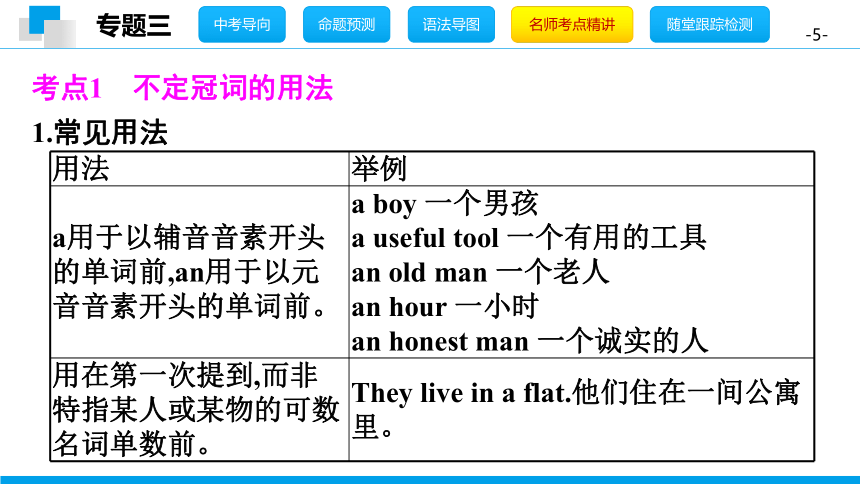
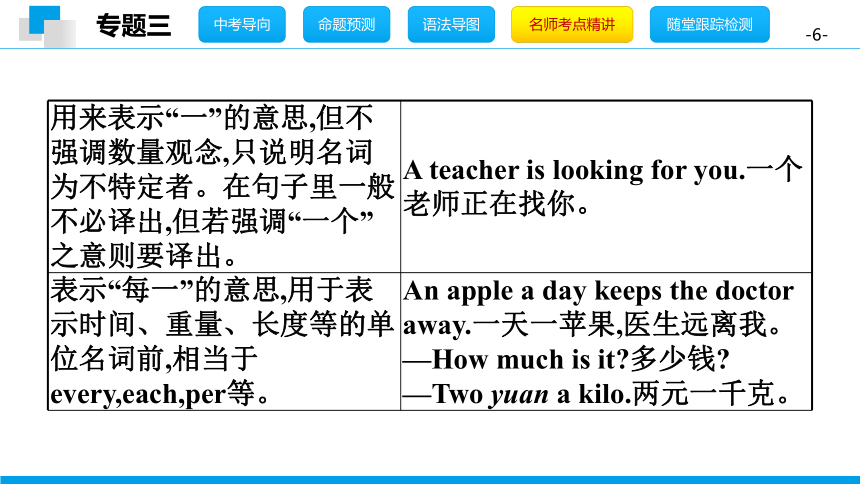
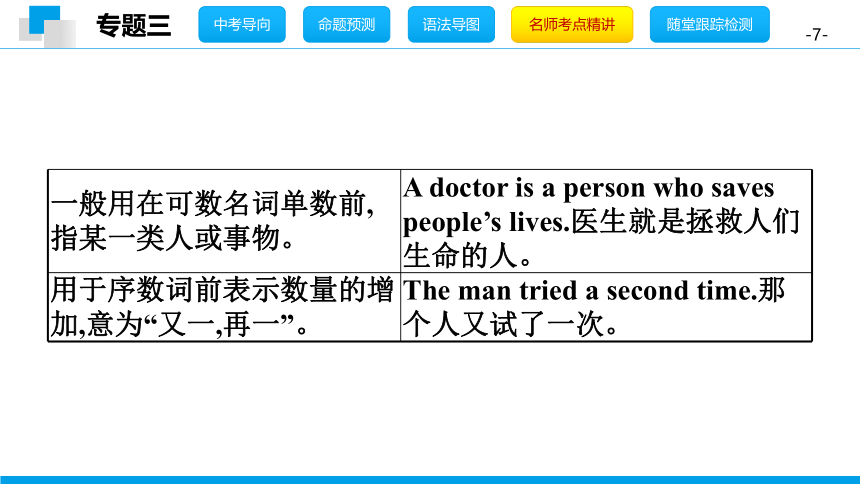
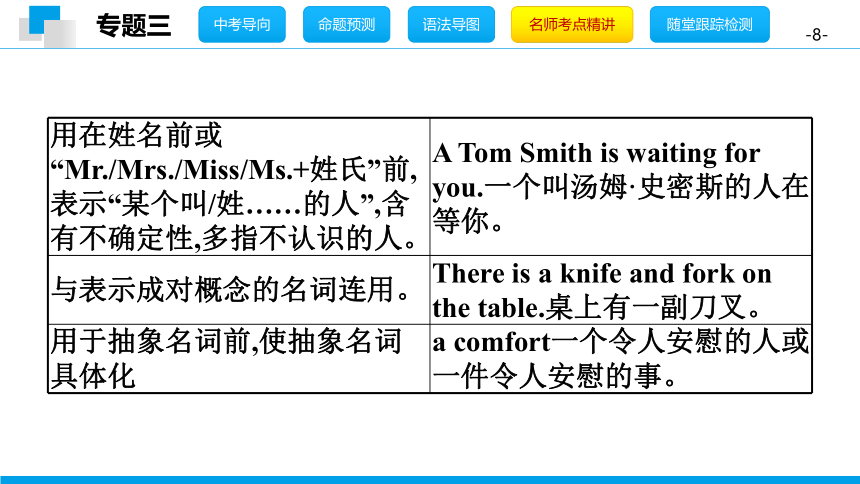
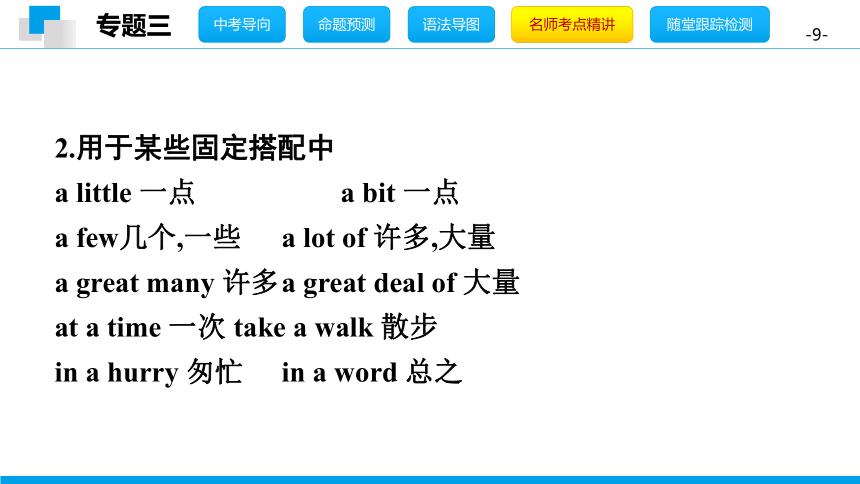
文档简介
(共29张PPT)
专题三 冠 词
1.不定冠词a/an、定冠词the和零冠词(即不加冠词)的用法;
2.含不定冠词、定冠词的习语和固定用法。
冠词的用法是考生需要掌握的基础知识。虽然近几年安徽中考没有在单项填空中直接考查冠词,但却在其他题目中间接地渗透了冠词的知识。因此,考生也不应该忽视冠词,要掌握定冠词、不定冠词和零冠词的用法,特别是冠词在固定短语中的正确运用。
考点1 不定冠词的用法
1.常见用法
用法
举例
a用于以辅音音素开头的单词前,an用于以元音音素开头的单词前。
a
boy
一个男孩
a
useful
tool
一个有用的工具
an
old
man
一个老人
an
hour
一小时
an
honest
man
一个诚实的人
用在第一次提到,而非特指某人或某物的可数名词单数前。
They
live
in
a
flat.他们住在一间公寓里。
用来表示“一”的意思,但不强调数量观念,只说明名词为不特定者。在句子里一般不必译出,但若强调“一个”之意则要译出。
A
teacher
is
looking
for
you.一个老师正在找你。
表示“每一”的意思,用于表示时间、重量、长度等的单位名词前,相当于every,each,per等。
An
apple
a
day
keeps
the
doctor
away.一天一苹果,医生远离我。
—How
much
is
it?多少钱?
—Two
yuan
a
kilo.两元一千克。
一般用在可数名词单数前,指某一类人或事物。
A
doctor
is
a
person
who
saves
people’s
lives.医生就是拯救人们生命的人。
用于序数词前表示数量的增加,意为“又一,再一”。
The
man
tried
a
second
time.那个人又试了一次。
用在姓名前或“Mr./Mrs./Miss/Ms.+姓氏”前,表示“某个叫/姓……的人”,含有不确定性,多指不认识的人。
A
Tom
Smith
is
waiting
for
you.一个叫汤姆·史密斯的人在等你。
与表示成对概念的名词连用。
There
is
a
knife
and
fork
on
the
table.桌上有一副刀叉。
用于抽象名词前,使抽象名词具体化
a
comfort一个令人安慰的人或一件令人安慰的事。
2.用于某些固定搭配中
a
little
一点 a
bit
一点
a
few几个,一些
a
lot
of
许多,大量
a
great
many
许多
a
great
deal
of
大量
at
a
time
一次
take
a
walk
散步
in
a
hurry
匆忙
in
a
word
总之
have
a
try
试一试
have
a
rest
休息一下
in
a
moment
立即
as
a
result
结果
on
a
diet
节食
after
a
while
一会儿后
all
of
a
sudden
突然间
once
in
a
while
偶尔
as
a
matter
of
fact
事实上
useful[?ju?sfl]的首字母虽然是元音字母“u”,但是其发音是以半元音[j]开头,故其前用冠词a修饰;而honest[??nIst]是以元音[?]开头,“h”不发音,故其前用冠词an修饰。
考点2 定冠词的用法
1.常见用法
用法
举例
特指某(些)人或某(些)事物。
The
book
on
the
desk
is
mine.桌子上的那本书是我的。
指双方都知道的人或事物。
Open
the
window,please.请把窗户打开。
指上文提到的人或事物。
He
lives
on
a
farm.The
farm
is
not
big.他住在一个农场里。那个农场不大。
用在世界上独一无二的事物前。
The
sun
is
bigger
than
the
moon.太阳比月亮大。
用在序数词或形容词、副词最高级前。
The
first
island
is
the
biggest
of
the
three.第一个岛是这三个岛中最大的。
用在由普通名词构成的专有名词以及党派、国家、江河、海洋、山脉、群岛等专有名词前。
the
Great
Wall长城
the
Yellow
River黄河
the
Science
Museum科技博物馆
用在某些形容词前表示一类人,表复数含义,作主语时,谓语动词应用复数形式。
the
old老人 the
sick病人
the
rich富人 the
blind盲人
用在姓氏复数形式前表示一家人。
The
Smiths
have
moved
to
London.史密斯一家已经搬去伦敦了。
用在乐器名词前。
play
the
piano/guitar/violin弹钢琴/弹吉他/拉小提琴
用在方位名词前。
on
the
left/right在左/右侧
in
the
east/west/south/north在东/西/南/北方
固定句型“The+比较级+其他,the+比较级+其他”表示“越……就越……”。
The
harder
you
work
at
your
study,the
better
grades
you
will
have.你学习越努力,你的成绩就越好。
表示年代时,用于整“十”的复数数词前。
in
the
1990s在20世纪90年代
“动词+人+介词+the+身体器官”表示“……某人的某个部位”。
take
sb.by
the
arm抓住某人的手臂
hit
sb.on
the
head打某人的头
2.用在某些固定搭配中
by
the
way顺便问一句
in
the
sky在天上
all
the
time总是
in
the
end
最后
on
the
Internet在网上
the
same
as...与……一样
look
the
same看起来一样
listen
to
the
radio听广播
in
the
middle
of在……的中间
at
the
beginning/end
of在……开始/结束时
at
the
same
time同时
in
the
morning/afternoon/evening在上午/下午/晚上
一般情况下,定冠词放在名词的前面,若名词前有形容词等修饰语,则放在相应的修饰语前。但是当定冠词与all,
half,
both,
double等词连用的时候,应该把定冠词放在这些词的后面。例如:
Look!
All
the
toys
are
here!看!所有的玩具都在这里!
Both
the
girls
are
from
the
USA.这两个女孩都来自美国。
They
just
walked
half
the
journey!他们才走了一半路程!
考点3 零冠词的用法
1.常见用法
用法
举例
专有名词前一般不用冠词。
The
Queen
of
England
lives
in
Buckingham
Palace.英国女王住在白金汉宫。
可数名词复数前一般不用冠词,表示一类人或事物。
They
are
teachers.他们是教师。
抽象名词前不用冠词,表示一般概念。
Failure
is
the
mother
of
success.失败乃成功之母。
物质名词前不用冠词。
Man
cannot
live
without
water.人离开水就无法生存。
季节、月份、节假日、日期、星期等表示时间的名词前一般不用冠词。
We
don’t
go
to
school
on
Saturday.我们周六不上学。
在称呼或表示官衔、职位的名词前不加冠词。
The
guards
took
the
American
to
General
Lee.护卫把这个美国人带到李将军那里。
在表示三餐、球类运动和棋类运动的名词前不加冠词。
have
breakfast吃早餐
play
chess下象棋
当两个或两个以上名词并用时,常省去冠词。
I
can’t
write
without
pen
or
pencil.没有钢笔或铅笔,我就写不了字。
当by与交通工具连用,表示一种出行方式时,交通工具名词前无冠词,并用名词单数形式。
by
bus乘公交车
by
train乘火车
序数词前有作定语的this,that,my,your,some,any等限定词修饰时,不加冠词。
This
is
my
first
time
to
meet
you.这是我第一次和你见面。
2.用在某些固定搭配中
at
home在家 on
foot步行
on
time准时
for
example例如
in
fact事实上
in
danger在危险中
at
work在上班
on
business出差
in
time及时
on
show/display展览
in
trouble有麻烦
on
duty值日
at
once立即,马上
at
night/noon在晚上/中午
注意:在某些短语中,有定冠词与无定冠词意义不同。常见情况如下:
in
class
在课堂上
in
the
class
在班上
in
front
of
the
room
在房间的前面(外面)
in
the
front
of
the
room
在房间的前部(里面)
go
to
bed
上床睡觉
go
to
the
bed
走到床前
in
hospital
生病住院
in
the
hospital
在医院里
at
table
在吃饭
at
the
table
在桌子旁边
by
sea
乘船
by
the
sea
在海边
in
future
今后
in
the
future
在未来
go
to
school
去上学
go
to
the
school
去学校
单项填空
1.The
operation
is
success,
and
the
patient
is
now
out
of
danger.(
D
)?
A.a;the
B./;/
C./;the
D.a;/
2.This
is
best
kind
of
pen
you
can
get
here.(
C
)?
A.the;the
B.the;a
C.the;/
D.a;the
3.Jason
likes shape
of
the
cake.
It
is heart.
(
A
)?
A.the;a
B.a;the
C.the;the
D.a;a
4.—Did
you
have good
time
yesterday??
—Yeah,
I
really
had fun
at
the
party!(
A
)?
A.a;/
B.a;the
C./;the
D./;a
5.The
cakes
are
delicious.
I’d
like
to
have
third
one
as
second
one
I
ate
was
too
small.(
B
)?
A.the;the
B.a;the
C.the;a
D.a;a
6.It
is
reported
that
a
terrible
rainstorm
hit
south
of
our
country
last
night.(
A
)?
A.the
B.a
C.an
D./
7.—Who
is girl
behind
the
tree??
—Which
one?
The
one
with umbrella?(
B
)?
A.a;the
B.the;an
C.the;a
D.a;an
8.I
have European
pen
friend,
and
he
likes
playing guitar.(
D
)?
A.an;/
B.an;the
C.a;/
D.a;the
9.The
education
of
young
is
always
hot
and
serious
topic.(
B
)?
A./;/
B.the;a
C./;the
D.the;/
10.—How
did
you
know news
about
Greenpeace,
Lisa??
—Well,
I
got
it
from China
Daily.(
B
)?
A.a;the
B.the;/
C.the;the
D.an;/
11.Hurry
up!
The
concert
will
begin
in minute.
(
A
)?
A.a
B.an
C.the
D./
12.I
enjoy
playing
basketball
with
my
friends.It
makes
me
feel
relaxed.(
D
)?
A.a
B.an
C.the
D./
专题三 冠 词
1.不定冠词a/an、定冠词the和零冠词(即不加冠词)的用法;
2.含不定冠词、定冠词的习语和固定用法。
冠词的用法是考生需要掌握的基础知识。虽然近几年安徽中考没有在单项填空中直接考查冠词,但却在其他题目中间接地渗透了冠词的知识。因此,考生也不应该忽视冠词,要掌握定冠词、不定冠词和零冠词的用法,特别是冠词在固定短语中的正确运用。
考点1 不定冠词的用法
1.常见用法
用法
举例
a用于以辅音音素开头的单词前,an用于以元音音素开头的单词前。
a
boy
一个男孩
a
useful
tool
一个有用的工具
an
old
man
一个老人
an
hour
一小时
an
honest
man
一个诚实的人
用在第一次提到,而非特指某人或某物的可数名词单数前。
They
live
in
a
flat.他们住在一间公寓里。
用来表示“一”的意思,但不强调数量观念,只说明名词为不特定者。在句子里一般不必译出,但若强调“一个”之意则要译出。
A
teacher
is
looking
for
you.一个老师正在找你。
表示“每一”的意思,用于表示时间、重量、长度等的单位名词前,相当于every,each,per等。
An
apple
a
day
keeps
the
doctor
away.一天一苹果,医生远离我。
—How
much
is
it?多少钱?
—Two
yuan
a
kilo.两元一千克。
一般用在可数名词单数前,指某一类人或事物。
A
doctor
is
a
person
who
saves
people’s
lives.医生就是拯救人们生命的人。
用于序数词前表示数量的增加,意为“又一,再一”。
The
man
tried
a
second
time.那个人又试了一次。
用在姓名前或“Mr./Mrs./Miss/Ms.+姓氏”前,表示“某个叫/姓……的人”,含有不确定性,多指不认识的人。
A
Tom
Smith
is
waiting
for
you.一个叫汤姆·史密斯的人在等你。
与表示成对概念的名词连用。
There
is
a
knife
and
fork
on
the
table.桌上有一副刀叉。
用于抽象名词前,使抽象名词具体化
a
comfort一个令人安慰的人或一件令人安慰的事。
2.用于某些固定搭配中
a
little
一点 a
bit
一点
a
few几个,一些
a
lot
of
许多,大量
a
great
many
许多
a
great
deal
of
大量
at
a
time
一次
take
a
walk
散步
in
a
hurry
匆忙
in
a
word
总之
have
a
try
试一试
have
a
rest
休息一下
in
a
moment
立即
as
a
result
结果
on
a
diet
节食
after
a
while
一会儿后
all
of
a
sudden
突然间
once
in
a
while
偶尔
as
a
matter
of
fact
事实上
useful[?ju?sfl]的首字母虽然是元音字母“u”,但是其发音是以半元音[j]开头,故其前用冠词a修饰;而honest[??nIst]是以元音[?]开头,“h”不发音,故其前用冠词an修饰。
考点2 定冠词的用法
1.常见用法
用法
举例
特指某(些)人或某(些)事物。
The
book
on
the
desk
is
mine.桌子上的那本书是我的。
指双方都知道的人或事物。
Open
the
window,please.请把窗户打开。
指上文提到的人或事物。
He
lives
on
a
farm.The
farm
is
not
big.他住在一个农场里。那个农场不大。
用在世界上独一无二的事物前。
The
sun
is
bigger
than
the
moon.太阳比月亮大。
用在序数词或形容词、副词最高级前。
The
first
island
is
the
biggest
of
the
three.第一个岛是这三个岛中最大的。
用在由普通名词构成的专有名词以及党派、国家、江河、海洋、山脉、群岛等专有名词前。
the
Great
Wall长城
the
Yellow
River黄河
the
Science
Museum科技博物馆
用在某些形容词前表示一类人,表复数含义,作主语时,谓语动词应用复数形式。
the
old老人 the
sick病人
the
rich富人 the
blind盲人
用在姓氏复数形式前表示一家人。
The
Smiths
have
moved
to
London.史密斯一家已经搬去伦敦了。
用在乐器名词前。
play
the
piano/guitar/violin弹钢琴/弹吉他/拉小提琴
用在方位名词前。
on
the
left/right在左/右侧
in
the
east/west/south/north在东/西/南/北方
固定句型“The+比较级+其他,the+比较级+其他”表示“越……就越……”。
The
harder
you
work
at
your
study,the
better
grades
you
will
have.你学习越努力,你的成绩就越好。
表示年代时,用于整“十”的复数数词前。
in
the
1990s在20世纪90年代
“动词+人+介词+the+身体器官”表示“……某人的某个部位”。
take
sb.by
the
arm抓住某人的手臂
hit
sb.on
the
head打某人的头
2.用在某些固定搭配中
by
the
way顺便问一句
in
the
sky在天上
all
the
time总是
in
the
end
最后
on
the
Internet在网上
the
same
as...与……一样
look
the
same看起来一样
listen
to
the
radio听广播
in
the
middle
of在……的中间
at
the
beginning/end
of在……开始/结束时
at
the
same
time同时
in
the
morning/afternoon/evening在上午/下午/晚上
一般情况下,定冠词放在名词的前面,若名词前有形容词等修饰语,则放在相应的修饰语前。但是当定冠词与all,
half,
both,
double等词连用的时候,应该把定冠词放在这些词的后面。例如:
Look!
All
the
toys
are
here!看!所有的玩具都在这里!
Both
the
girls
are
from
the
USA.这两个女孩都来自美国。
They
just
walked
half
the
journey!他们才走了一半路程!
考点3 零冠词的用法
1.常见用法
用法
举例
专有名词前一般不用冠词。
The
Queen
of
England
lives
in
Buckingham
Palace.英国女王住在白金汉宫。
可数名词复数前一般不用冠词,表示一类人或事物。
They
are
teachers.他们是教师。
抽象名词前不用冠词,表示一般概念。
Failure
is
the
mother
of
success.失败乃成功之母。
物质名词前不用冠词。
Man
cannot
live
without
water.人离开水就无法生存。
季节、月份、节假日、日期、星期等表示时间的名词前一般不用冠词。
We
don’t
go
to
school
on
Saturday.我们周六不上学。
在称呼或表示官衔、职位的名词前不加冠词。
The
guards
took
the
American
to
General
Lee.护卫把这个美国人带到李将军那里。
在表示三餐、球类运动和棋类运动的名词前不加冠词。
have
breakfast吃早餐
play
chess下象棋
当两个或两个以上名词并用时,常省去冠词。
I
can’t
write
without
pen
or
pencil.没有钢笔或铅笔,我就写不了字。
当by与交通工具连用,表示一种出行方式时,交通工具名词前无冠词,并用名词单数形式。
by
bus乘公交车
by
train乘火车
序数词前有作定语的this,that,my,your,some,any等限定词修饰时,不加冠词。
This
is
my
first
time
to
meet
you.这是我第一次和你见面。
2.用在某些固定搭配中
at
home在家 on
foot步行
on
time准时
for
example例如
in
fact事实上
in
danger在危险中
at
work在上班
on
business出差
in
time及时
on
show/display展览
in
trouble有麻烦
on
duty值日
at
once立即,马上
at
night/noon在晚上/中午
注意:在某些短语中,有定冠词与无定冠词意义不同。常见情况如下:
in
class
在课堂上
in
the
class
在班上
in
front
of
the
room
在房间的前面(外面)
in
the
front
of
the
room
在房间的前部(里面)
go
to
bed
上床睡觉
go
to
the
bed
走到床前
in
hospital
生病住院
in
the
hospital
在医院里
at
table
在吃饭
at
the
table
在桌子旁边
by
sea
乘船
by
the
sea
在海边
in
future
今后
in
the
future
在未来
go
to
school
去上学
go
to
the
school
去学校
单项填空
1.The
operation
is
success,
and
the
patient
is
now
out
of
danger.(
D
)?
A.a;the
B./;/
C./;the
D.a;/
2.This
is
best
kind
of
pen
you
can
get
here.(
C
)?
A.the;the
B.the;a
C.the;/
D.a;the
3.Jason
likes shape
of
the
cake.
It
is heart.
(
A
)?
A.the;a
B.a;the
C.the;the
D.a;a
4.—Did
you
have good
time
yesterday??
—Yeah,
I
really
had fun
at
the
party!(
A
)?
A.a;/
B.a;the
C./;the
D./;a
5.The
cakes
are
delicious.
I’d
like
to
have
third
one
as
second
one
I
ate
was
too
small.(
B
)?
A.the;the
B.a;the
C.the;a
D.a;a
6.It
is
reported
that
a
terrible
rainstorm
hit
south
of
our
country
last
night.(
A
)?
A.the
B.a
C.an
D./
7.—Who
is girl
behind
the
tree??
—Which
one?
The
one
with umbrella?(
B
)?
A.a;the
B.the;an
C.the;a
D.a;an
8.I
have European
pen
friend,
and
he
likes
playing guitar.(
D
)?
A.an;/
B.an;the
C.a;/
D.a;the
9.The
education
of
young
is
always
hot
and
serious
topic.(
B
)?
A./;/
B.the;a
C./;the
D.the;/
10.—How
did
you
know news
about
Greenpeace,
Lisa??
—Well,
I
got
it
from China
Daily.(
B
)?
A.a;the
B.the;/
C.the;the
D.an;/
11.Hurry
up!
The
concert
will
begin
in minute.
(
A
)?
A.a
B.an
C.the
D./
12.I
enjoy
playing
basketball
with
my
friends.It
makes
me
feel
relaxed.(
D
)?
A.a
B.an
C.the
D./
同课章节目录
- 词法
- 名词
- 动词和动词短语
- 动词语态
- 动词时态
- 助动词和情态动词
- 非谓语动词
- 冠词
- 代词
- 数词和量词
- 形容词副词及其比较等级
- 介词和介词短语
- 连词和感叹词
- 构词法
- 相似、相近词比较
- 句法
- 陈述句
- 一般疑问句和否定疑问句
- 特殊疑问句及选择疑问句
- 反意疑问句
- 存在句(There be句型)
- 宾语从句
- 定语从句
- 状语从句
- 主谓一致问题
- 简单句
- 并列句
- 复合句
- 主谓一致
- 主、表语从句
- 名词性从句
- 直接引语和间接引语
- 虚拟语气
- 感叹句
- 强调句
- 倒装句
- 祈使句
- 句子的成分
- 句子的分类
- 题型专区
- 单项选择部分
- 易错题
- 完形填空
- 阅读理解
- 词汇练习
- 听说训练
- 句型转换
- 补全对话
- 短文改错
- 翻译
- 书面表达
- 任务型阅读
- 语法填空
- 其他资料
